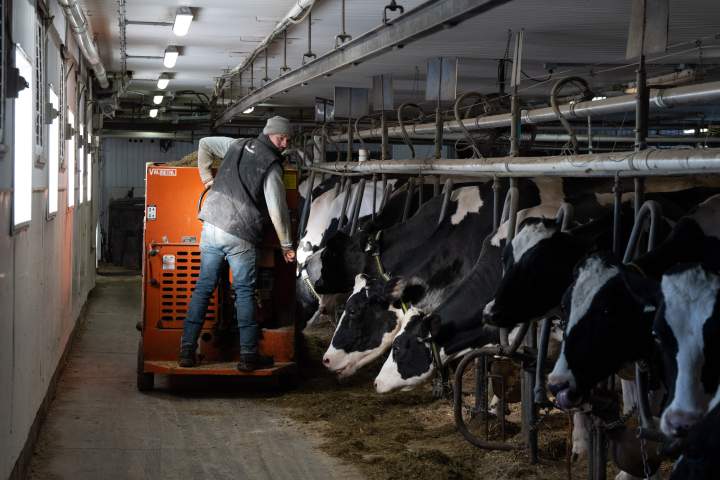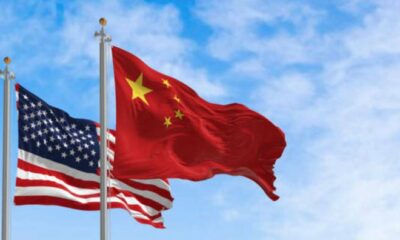Top Stories
Urgent: Canada’s Supply Management Sparks Trade Tensions with U.S.

UPDATE: Tensions escalate in Canada-U.S. trade negotiations as President Donald Trump intensifies criticism of Canada’s supply management system just days ahead of a crucial deadline. The trade deal is set for completion by July 15, 2023, yet supply management remains a significant hurdle that could derail discussions.
Trump has repeatedly targeted Canada’s approach to dairy, poultry, and egg sectors, labeling the nation as “very difficult to trade with.” He accuses Canada of imposing tariffs as high as 400% on dairy products, claiming that the country is “ripping us off.” This comes amid his push for Canada to eliminate its digital services tax, further complicating the negotiations.
Canada’s supply management system, established in the 1970s, is designed to protect domestic producers and maintain stable prices by regulating the amount of foreign dairy products allowed into the country. As it stands, under the recent Canada-United States-Mexico Agreement (CUSMA), the U.S. is permitted access to less than 5% of Canada’s dairy market.
Prime Minister Mark Carney has made it clear that Canada’s supply management will not be up for negotiation. “We are committed to keeping it off the table,” he stated, emphasizing its importance to Canadian farmers.
Quebec Premier François Legault reinforced this stance, declaring, “There’s no question about negotiating the supply management for dairy and other products.” This reflects a broader consensus among Canadian politicians who view supply management as a non-negotiable issue, even if it risks potential economic repercussions.
The political stakes are high, particularly in Quebec, where dairy farmers hold significant sway. Expert Vincent Geloso notes that “in 17 ridings provincially in Quebec, people under supply management are strong enough to change the outcome of the election.” This gives the dairy industry substantial political clout, making it a critical factor in the negotiations.
Despite the pressures from the U.S., Canadian authorities remain steadfast. Economist Sven Anders points out that Canadian dairy farms could not withstand the competition from larger American farms, warning that many would be forced to merge into mega-farms to survive, which would devastate local agricultural communities.
Interestingly, supply management has also shielded Canadian consumers from the price volatility seen in the U.S., where egg prices have soared in recent months. However, critics argue that this system leads to higher prices for Canadian consumers. “An average Canadian household pays several hundred dollars more annually due to supply management,” Anders stated.
As discussions continue, the impact of these negotiations will be felt across both borders. The U.S. has expressed frustration over Canada’s alleged bottlenecking of imports through tariff rate quotas, which limits the number of exporters eligible for lower duties. The outcome of these talks could have significant ramifications for both nations, especially as Trump prepares for critical midterm elections in 2024, where maintaining support from Wisconsin dairy farmers is vital for the Republican Party.
As both sides prepare for further negotiations, the focus will remain on whether Canada can hold its ground on supply management without jeopardizing the broader trade relationship. Observers are urged to stay tuned for updates as this story develops.
-

 World3 months ago
World3 months agoScientists Unearth Ancient Antarctic Ice to Unlock Climate Secrets
-

 Entertainment3 months ago
Entertainment3 months agoTrump and McCormick to Announce $70 Billion Energy Investments
-

 Science3 months ago
Science3 months agoFour Astronauts Return to Earth After International Space Station Mission
-

 Lifestyle3 months ago
Lifestyle3 months agoTransLink Launches Food Truck Program to Boost Revenue in Vancouver
-

 Technology2 months ago
Technology2 months agoApple Notes Enhances Functionality with Markdown Support in macOS 26
-

 Top Stories1 week ago
Top Stories1 week agoUrgent Update: Fatal Crash on Highway 99 Claims Life of Pitt Meadows Man
-

 Sports3 months ago
Sports3 months agoSearch Underway for Missing Hunter Amid Hokkaido Bear Emergency
-

 Politics2 months ago
Politics2 months agoUkrainian Tennis Star Elina Svitolina Faces Death Threats Online
-

 Technology3 months ago
Technology3 months agoFrosthaven Launches Early Access on July 31, 2025
-

 Politics3 months ago
Politics3 months agoCarney Engages First Nations Leaders at Development Law Summit
-

 Entertainment3 months ago
Entertainment3 months agoCalgary Theatre Troupe Revives Magic at Winnipeg Fringe Festival
-

 Politics1 week ago
Politics1 week agoShutdown Reflects Democratic Struggles Amid Economic Concerns





















